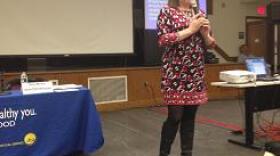The Massachusetts Department of Transitional Assistance recently recognized client success in western Massachusetts as the department looks to regain public trust after coming under scrutiny for handing out fraudulent benefits.
Through recognition ceremonies the department celebrated the achievements of more than 330 people in the agency’s Springfield, Holyoke and Pittsfield offices. DTA Commissioner Stacey Monahan says getting those receiving state assistance to a level of economic self-sufficiency is the department’s core mission.
“Every single thing that someone does on that ladder we want to recognize them for,” Monahan said. “It’s great. People bring their families and children and their families bring flowers and balloons. It’s a big celebration and for some of our clients they have never been celebrated before.”
Monahan says the department is placing full-time engagement workers in the agency’s 22 offices to find employment and training opportunities that fit their needs and interests. Monahan was named interim commissioner in February 2013 and has since shed the interim title. Commissioner Daniel Curley resigned after a report released in January 2013 by Massachusetts Inspector General Glen Cunha revealed the state’s welfare system had given out $25 million in fraudulent benefits annually. An audit from state Auditor Suzanne Bump in May 2013 showed that between July 2010 and December 2012, welfare benefits were paid out to more than 1,160 beneficiaries in Massachusetts who were deceased.
“So in 2013 we did a lot with our 100-Day Action Plan where we restored public trust and legislative confidence,” Monahan said. “We want taxpayers to know that their dollars being spent as appropriate and as intended. A lot of those initiatives are sort of ongoing.”
To prevent benefits from being dispersed into the account of a deceased person, the agency added a weekly Department of Commerce match which Monahan says is faster than a Social Security death notice, but for which DTA workers need a secondary confirmation such as an obituary. She hopes to speed up that process even more through a program set to come online this month with the state’s public health department using death notices from town clerks. The agency launched an ATM point-of-sale blocking initiative to prevent recipients from withdrawing cash at prohibited retailers, such as liquor stores. Through bi-weekly reports Monahan says the state has reviewed 5.5 million transactions and done on-site reviews of 1,500 retail locations.
“We’ve blocked over a 1,000 locations where people can’t withdraw their cash or can’t make a purchase,” Monahan said. “Since 2011 to January of this year, those are the most current numbers I have it’s been 95 percent drop in the use of cash benefits at the locations we’ve identified as prohibited.”
In an effort to be proactive against fraudulent uses, the DTA has increased its number of investigators from four to 18, according to Monahan. Pending welfare reform legislation would further increase agency staffing. She says the agency is working with the Division of Professional Licensure to block benefits from being used at places like nail salons.
“Our investigators now when they are out on the on road they have EBT cards that have no cash value on them, but if they go into a place that should be blocked they can go like they’re trying to make a purchase and the receipt that generates has all of the data that we need to do the actual blocking,” explained Monahan.
DTA has also taken steps to increase its use of electronic documentation and verification to speed up benefit eligibility and delivery. Over the past year, 100 police departments have signed onto a partnership which allows local officers to investigate retail locations where they believe people may be selling their SNAP benefits, formerly known as food stamps. Previously federal investigators were the only ones who could pursue those cases. The agency is also focusing on healthy eating. Mobile farmers markets which accept SNAP, visit food deserts across the state while a new program will allow people to use SNAP benefits to buy community agricultural shares, according to Monahan.
“We have 150 clients and 10 farms that are participating in that,” she said. “We’ll pay the farmers directly so it’s a nice source of revenue that they can count on a weekly basis which is really important for the farming industry.”
Yasmin Otero is DTA’s Western Regional Director. She says there are food deserts in urban places like Springfield and even ones in rural areas like Berkshire County.
“You can probably point to communities here where there isn’t a full-service grocery store in 10 miles…the remote access of people living in some of the smaller communities, the Floridas, the Perus,” explained Otero.
Still, Otero says overall DTA case loads are increasing, not as dramatically as they were in the immediate years after the recession, but there are more first-time applicants whose unemployment has run out and haven’t been able to find a new job. Nathan Skrocki directs DTA’s Pittsfield office along with a satellite location in North Adams which combined serve 9,000 people.
“One of the unique challenges to Berkshire County in general is probably transportation for folks,” Skrocki said. “Whether it be coming to our office for the needs they have from us or just finding jobs in general and getting to those jobs. We don’t have the same type of transportation system that some of the cities in the state have.”






